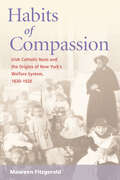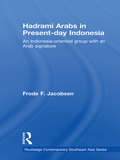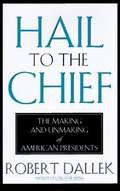- Table View
- List View
Habermas: The Key Concepts (Routledge Key Guides)
by Andrew EdgarAn independently minded champion of ‘the project of modernity’ in a supposedly post-modern age, Jurgen Habermas (1929- ) is one of the most widely influential thinkers of our times. An easy-to-use A-Z guide to a body of work that spans philosophy, sociology, politics, law and cultural theory, Habermas: The Key Concepts explores Habermas’ writings on: capitalism genetics law neo-conservatism universal pragmatics. Fully cross-referenced with extensive suggestions for further reading, this is an essential reference guide to one of the most important social theorists of the last century.
Habits of Compassion: Irish Catholic Nuns and the Origins of New York's Welfare System, 1830-1920 (Women, Gender, and Sexuality in American History)
by Maureen FitzgeraldThe Irish-Catholic Sisters accomplished tremendously successful work in founding charitable organizations in New York City from the Irish famine through the early twentieth century. Maureen Fitzgerald argues that their championing of the rights of the poor—especially poor women—resulted in an explosion of state-supported services and programs. Parting from Protestant belief in meager and means-tested aid, Irish Catholic nuns argued for an approach based on compassion for the poor. Fitzgerald positions the nuns' activism as resistance to Protestantism's cultural hegemony. As she shows, Roman Catholic nuns offered strong and unequivocal moral leadership in condemning those who punished the poor for their poverty and unmarried women for sexual transgression. Fitzgerald also delves into the nuns' own communities, from the class-based hierarchies within the convents to the political power they wielded within the city. That power, amplified by an alliance with the local Irish Catholic political machine, allowed the women to expand public charities in the city on an unprecedented scale.
Hablar de todo y no saber de nada: Las tertulias y la nueva política
by Joan LópezEl papel de la tertulia española en el mundo mediático y político: ¿fuente de información o intoxicación mediática? Las tertulias fueron en el pasado un género minoritario creado con la voluntad de ofrecer información complementaria acerca de los temas de actualidad. Sin embargo, el feroz mundo mediático del siglo XXI ha obligado a las tertulias a cambiar de formato hasta convertirlas en un espectáculo que se emite en horas de máxima audiencia. Al conquistar la parrilla televisiva, las tertulias han derivado en puro entretenimiento dónde la opinión y la confrontación ideológica parecen ser los ingredientes del éxito. ¿Quién determina la línea editorial de los programas?¿La tertulia es fuente de información o es intoxicación mediática?¿Existe el tertuliano libre?¿Cómo se llega a ser tertuliano?¿Cómo se preparan las tertulias?¿Qué pasa en las cadenas de televisión pública? En este fascinante ensayo, Joan López analiza el papel de la tertulia en nuestro país mediante una serie de capítulos divulgativos y polémicos que ponen en entredicho su contribución efectiva al debate público ya que parecen regirse más por el sesgo ideológico que marcan sus respectivas cadenas que por una voluntad honesta de análisis de la actualidad política y social.
Habsburgs on the Rio Grande: The Rise and Fall of the Second Mexican Empire
by Raymond JonasThe story of how nineteenth-century European rulers conspired with Mexican conservatives in an outlandish plan to contain the rising US colossus by establishing Old World empire on its doorstep.The outbreak of the US Civil War provided an unexpected opportunity for political conservatives across continents. On one side were European monarchs. Mere decades after its founding, the United States had become a threat to European hegemony; instability in the United States could be exploited to lay a rival low. Meanwhile, Mexican antidemocrats needed a powerful backer to fend off the republicanism of Benito Juárez. When these two groups found each other, the Second Mexican Empire was born.Raymond Jonas argues that the Second Mexican Empire, often dismissed as a historical sideshow, is critical to appreciating the globally destabilizing effect of growing US power in the nineteenth century. In 1862, at the behest of Mexican reactionaries and with the initial support of Spain and Britain, Napoleon III of France sent troops into Mexico and installed Austrian archduke Ferdinand Maximilian as an imperial ruler who could resist democracy in North America. But what was supposed to be an easy victory proved a disaster. The French army was routed at the Battle of Puebla, and for the next four years, republican guerrillas bled the would-be empire. When the US Civil War ended, African American troops were dispatched to Mexico to hasten the French withdrawal.Based on research in five languages and in archives across the globe, Habsburgs on the Rio Grande fundamentally revises narratives of global history. Far more than a footnote, the Second Mexican Empire was at the center of world-historic great-power struggles—a point of inflection in a contest for supremacy that set the terms of twentieth-century rivalry.
Hacer que nos escuchen: ¿Cómo podemos los estadounidenses cambiar nuestra sociedad? (Relatos estadounidenses)
by DKInspira jóvenes curiosos a explorar cómo los estadounidenses se aliaron en la campaña por el cambio a lo largo de la historia y cómo es la vida en EE. UU. hoy en díaParte de una serie inspirante que apoya el aprendizaje acerca del gobierno y el civismo en un EE. UU. contemporáneo a través de eventos históricos y las personas que formaron los mismos. Hacer que nos escuchen interconecta contexto, personalidades y eventos históricos y las experiencias de estadounidenses modernos. Ayudará los estudiantes a entender temas claves de estudios sociales, como los orígenes de instituciones y valores de EE. UU. y la relevancia que tienen a las vidas de jóvenes hoy. El libro explora el civismo a lo largo de la historia de EE. UU., tanto en movimientos comunitarios como en campañas para el derecho al voto y derechos civiles. Temas y eventos históricos incluyen la Revolución estadounidense, la lucha para abolir la esclavitud, y campañas por el derecho al voto de la mujer y derechos laborales y civiles.
Hacia la estación Finlandia
by Edmund WilsonUN CLÁSICO IMPRESCINDIBLE PARA ENTENDER EL MUNDO EN EL QUE VIVIMOS, CON PRÓLOGO DE MARIO VARGAS LLOSA. «En una era de amnesia histórica, este libro nos recuerda que la historia está viva y abierta y llena de posibilidades y emociones.»The New York Times Book Review En este relato repleto de romance, idealismo, intriga y conspiración, historia intelectual a gran escala, Edmund Wilson rastrea las ideas revolucionarias que dieron forma al mundo moderno desde la Revolución francesa hasta la llegada de Lenin en 1917 a la estación de Finlandia en San Petersburgo. Es una crónica viva y de gran envergadura a la que subyace una idea singular y capaz de cambiar la historia: que es posible construir una sociedad basada en la justicia, la igualdad y la libertad. Anarquistas, socialistas, nihilistas y utópicos cobran vida en estas páginas, y sus ideas permanecen tan provocadoras y relevantes hoy como lo fueron en su tiempo. «Se trata de un libro absolutamente actual, que se puede leer y releer como las grandes novelas, y que, con los años transcurridos desde su publicación, ha ganado encanto y vigor, igual que las obras maestras literarias. […] Se lee como una ficción por la destreza y la imaginación con que está escrito, y la originalidad y la fuerza compulsiva de los caracteres que figuran en él —Renan, Taine, Babeuf, Saint-Simon, Fourier, Owen, Marx y Engels, Bakunin, Lassalle, Lenin y Trotski— que, gracias al poder de síntesis y la prosa de Wilson, se graban en la memoria del lector como los personajes de Los miserables, Los hermanos Karamazov o Guerra y paz. Se trata de una obra maestra que, por razones políticas, fue marginada, pese al altísimo valor que tiene desde el punto de vista literario.» Del prólogo de Mario Vargas Llosa La crítica ha dicho:«En una era de amnesia histórica, Hacia la estación de Finlandia nos recuerda que la historia está viva y abierta y llena de posibilidades y emociones.»Marshall Berman, The New York Times Book Review «Muy de vez en cuando descubres un libro de no ficción cuya trama es más atractiva y más rica en su comprensión de la naturaleza humana que mil novelas juntas. Este es uno de esos libros.»Aravind Adiga, NPR «Uno de los grandes monumentos radicales de nuestro tiempo. [...] Una maravilla de minuciosa erudición, sutil estructuración, elocuencia y fuerza narrativa.»The Observer
Hack Attack: The Inside Story of How the Truth Caught Up with Rupert Murdoch
by Nick DaviesThe definitive book on how the News of the World phone-hacking scandal reached the highest echelons of power in the government, security, and media in the UK, from the journalist who broke the story.At first, it seemed like a small story. The royal editor of the News of the World was caught listening to the voicemail messages of staff at Buckingham Palace. He and a private investigator were jailed, and the case was closed. But Nick Davies, special correspondent for The Guardian, knew that it didn't add up. He began to investigate, and ended up exposing a world of crime and cover-up, of fear and favor—the long shadow of Rupert Murdoch's media empire.Hack Attack is the mesmerizing story of how Davies and a small group of lawyers and politicians took on one of the most powerful men in the world—and beat him. It exposes the inner workings of the ruthless machine that was the News of the World, and of the private investigators who hacked phones, listened to live calls, sent Trojan horse emails, bribed the police, and committed burglaries to dig up tabloid scoops. Above all, it is a study of the private lives of the power elite. It paints an intimate portrait of the social network that gave Murdoch privileged access to government, and allowed him and his lieutenants to intimidate anyone who stood up to them. Spanning the course of the investigation from Davies's contact with his first source in early 2008 to the resolution of the criminal trial in June 2014, this is the definitive record of one of the major scandals of our time, written by the journalist who was there every step of the way.
Hack Attack: The full story of the phone hacking scandal
by Nick Davies**A SUNDAY TIMES BESTSELLER, THE TRUE STORY BEHIND ITV’S MAJOR NEW DRAMA, THE HACK**WITH EXPLOSIVE NEW EVIDENCE, THIS IS THE UPDATED EDITION OF THE BOOK THAT EXPOSED THE PHONE HACKING SCANDAL Crime, conspiracy, abuse of power – this is the inside story of the scandal that blew the lid off Rupert Murdoch’s empire. Nearly twenty years since one of Murdoch’s reporters was caught eavesdropping on Buckingham Palace, the revelations keep coming. And Nick Davies is still digging out new evidence.Hack Attack is the story of how Davies and a network of rebel lawyers, MPs and celebrities took on one of the most powerful men in the world and uncovered a web of crime and cover-up reaching from the Murdoch newsrooms to Scotland Yard and Downing Street. It was a scandal that shocked the British elite. And it’s not over yet.CONTAINS A NEW CHAPTER WITH ALL-NEW EVIDENCE'A colossal service to Britain's democracy' Financial Times'As exciting as a thriller but far more important' Daily Telegraph'A masterly summary of the hacking affair, as well as the ingenuity and persistence that lead to great journalism' Observer
Hack to The Future: How World Governments Relentlessly Pursue and Domesticate Hackers
by Emily CroseUnderstand the history of hacking culture and the genesis of a powerful modern subculture In Hack to the Future: How World Governments Relentlessly Pursue and Domesticate Hackers, veteran information security professional Emily Crose delivers a deep dive into the history of the United States government's nuanced relationship with hacker culture and the role the latter has played in the former's domestic policy and geopolitics. In the book, you'll learn about significant events that have changed the way the hacking community has been perceived by the public, the state, and other hackers. The author explains how the US government managed to weaponize a subculture widely seen as misanthropic and awkward into a lever of geopolitical power. You'll also discover how: The release of the Morris worm and the Melissa virus changed the way hackers were seen and treated in the United States Different government agencies, including the National Security Agency and NASA treated – and were treated by – domestic hackers Hacking went from being an exclusive hobby for socially awkward nerds to a substantial lever of geopolitical power in just a few decades Perfect for anyone with an interest in hacking, tech, infosec, and geopolitics, Hack to the Future is a must-read for those who seek to better their understanding of the history of hacking culture and how we got to where we are today.
Hacked Transmissions: Technology and Connective Activism in Italy
by Alessandra RenziMapping the transformation of media activism from the seventies to the present dayHacked Transmissions is a pioneering exploration of how social movements change across cycles of struggle and alongside technology. Weaving a rich fabric of local and international social movements and media practices, politicized hacking, and independent cultural production, it takes as its entry point a multiyear ethnography of Telestreet, a network of pirate television channels in Italy that combined emerging technologies with the medium of television to challenge the media monopoly of tycoon-turned-prime minister Silvio Berlusconi. Street televisions in Italy represented a unique experiment in combining old and new media to forge grassroots alliances, fight social isolation, and build more resilient communities. Alessandra Renzi digs for the roots of Telestreet in movements of the 1970s and the global activism of the 1990s to trace its transformations in the present work of one of the network&’s more active nodes, insu^tv, in Naples. In so doing, she offers a comprehensive account of transnational media activism, with particular attention to the relations among groups and projects, their modes of social reproduction, the contexts giving rise to them, and the technology they adopt—from zines and radios to social media. Hacked Transmissions is also a study in method, providing examples of co-research between activist researchers and social movements, and a theoretical framework that captures the complexities of grassroots politics and the agency of technology. Providing a rare and timely glimpse into a key activist/media project of the twenty-first century, Hacked Transmissions marks a vital contribution to debates in a range of fields, including media and communication studies, anthropology, science and technology studies, social movements studies, sociology, and cultural theory.
Hacker States (The Information Society Series)
by Adam Fish Luca FollisHow hackers and hacking moved from being a target of the state to a key resource for the expression and deployment of state power.In this book, Luca Follis and Adam Fish examine the entanglements between hackers and the state, showing how hackers and hacking moved from being a target of state law enforcement to a key resource for the expression and deployment of state power. Follis and Fish trace government efforts to control the power of the internet; the prosecution of hackers and leakers (including such well-known cases as Chelsea Manning, Edward Snowden, and Anonymous); and the eventual rehabilitation of hackers who undertake “ethical hacking” for the state. Analyzing the evolution of the state's relationship to hacking, they argue that state-sponsored hacking ultimately corrodes the rule of law and offers unchecked advantage to those in power, clearing the way for more authoritarian rule. Follis and Fish draw on a range of methodologies and disciplines, including ethnographic and digital archive methods from fields as diverse as anthropology, STS, and criminology. They propose a novel “boundary work” theoretical framework to articulate the relational approach to understanding state and hacker interactions advanced by the book. In the context of Russian bot armies, the rise of fake news, and algorithmic opacity, they describe the political impact of leaks and hacks, hacker partnerships with journalists in pursuit of transparency and accountability, the increasingly prominent use of extradition in hacking-related cases, and the privatization of hackers for hire.
Hacker, Hoaxer, Whistleblower, Spy: The Many Faces of Anonymous
by Gabriella ColemanHere is the ultimate book on the worldwide movement of hackers, pranksters, and activists that operates under the non-name Anonymous, by the writer the Huffington Post says "knows all of Anonymous' deepest, darkest secrets."Half a dozen years ago, anthropologist Gabriella Coleman set out to study the rise of this global phenomenon just as some of its members were turning to political protest and dangerous disruption (before Anonymous shot to fame as a key player in the battles over WikiLeaks, the Arab Spring, and Occupy Wall Street). She ended up becoming so closely connected to Anonymous that the tricky story of her inside-outside status as Anon confidante, interpreter, and erstwhile mouthpiece forms one of the themes of this witty and entirely engrossing book.The narrative brims with details unearthed from within a notoriously mysterious subculture, whose semi-legendary tricksters--such as Topiary, tflow, Anachaos, and Sabu--emerge as complex, diverse, politically and culturally sophisticated people. Propelled by years of chats and encounters with a multitude of hackers, including imprisoned activist Jeremy Hammond and the double agent who helped put him away, Hector Monsegur, Hacker, Hoaxer, Whistleblower, Spy is filled with insights into the meaning of digital activism and little understood facets of culture in the Internet age, including the history of "trolling," the ethics and metaphysics of hacking, and the origins and manifold meanings of "the lulz."
Hacking ISIS: How to Destroy the Cyber Jihad
by Malcolm Nance Christopher SampsonThis book is written by two of the leading terrorist experts in the world - Malcolm Nance, NBC News/MSNBC terrorism analyst and Christopher Sampson, cyber-terrorist expert. Malcolm Nance is a 35 year practitioner in Middle East Special Operations and terrorism intelligence activities. Chris Sampson is the terrorism media and cyber warfare expert for the Terror Asymmetric Project and has spent 15 years collecting and exploiting terrorism media. For two years, their Terror Asymmetrics Project has been attacking and exploiting intelligence found on ISIS Dark Web operations.Hacking ISIS will explain and illustrate in graphic detail how ISIS produces religious cultism, recruits vulnerable young people of all religions and nationalities and disseminates their brutal social media to the world.More, the book will map out the cyberspace level tactics on how ISIS spreads its terrifying content, how it distributes tens of thousands of pieces of propaganda daily and is winning the battle in Cyberspace and how to stop it in its tracks.Hacking ISIS is uniquely positioned to give an insider’s view into how this group spreads its ideology and brainwashes tens of thousands of followers to join the cult that is the Islamic State and how average computer users can engage in the removal of ISIS from the internet.
Hacking the Future: Privacy, Identity, and Anonymity on the Web
by Cole StrykerIs anonymity a crucial safeguard—or a threat to society? &“One of the most well-informed examinations of the Internet available today&” (Kirkus Reviews). &“The author explores the rich history of anonymity in politics, literature and culture, while also debunking the notion that only troublemakers fear revealing their identities to the world. In relatively few pages, the author is able to get at the heart of identity itself . . . Stryker also introduces the uninitiated into the &‘Deep Web,&’ alternative currencies and even the nascent stages of a kind of parallel Web that exists beyond the power of governments to switch it off. Beyond even that is the fundamental question of whether or not absolute anonymity is even possible.&” —Kirkus Reviews &“Stryker explains how significant web anonymity is to those key companies who mine user data personal information of, for example, the millions of members on social networks. . . . An impassioned, rational defense of web anonymity and digital free expression.&” —Publishers Weekly
Hacks, Leaks, and Revelations: The Art of Analyzing Hacked and Leaked Data
by Micah LeeData-science investigations have brought journalism into the 21st century, and—guided by The Intercept&’s infosec expert Micah Lee— this book is your blueprint for uncovering hidden secrets in hacked datasets.Unlock the internet&’s treasure trove of public interest data with Hacks, Leaks, and Revelations by Micah Lee, an investigative reporter and security engineer. This hands-on guide blends real-world techniques for researching large datasets with lessons on coding, data authentication, and digital security. All of this is spiced up with gripping stories from the front lines of investigative journalism.Dive into exposed datasets from a wide array of sources: the FBI, the DHS, police intelligence agencies, extremist groups like the Oath Keepers, and even a Russian ransomware gang. Lee&’s own in-depth case studies on disinformation-peddling pandemic profiteers and neo-Nazi chatrooms serve as blueprints for your research.Gain practical skills in searching massive troves of data for keywords like &“antifa&” and pinpointing documents with newsworthy revelations. Get a crash course in Python to automate the analysis of millions of files.You will also learn how to:Master encrypted messaging to safely communicate with whistleblowers.Secure datasets over encrypted channels using Signal, Tor Browser, OnionShare, and SecureDrop.Harvest data from the BlueLeaks collection of internal memos, financial records, and more from over 200 state, local, and federal agencies.Probe leaked email archives about offshore detention centers and the Heritage Foundation.Analyze metadata from videos of the January 6 attack on the US Capitol, sourced from the Parler social network.We live in an age where hacking and whistleblowing can unearth secrets that alter history. Hacks, Leaks, and Revelations is your toolkit for uncovering new stories and hidden truths. Crack open your laptop, plug in a hard drive, and get ready to change history.
Hacks: The Inside Story Of The Break-ins And Breakdowns That Put Donald Trump In The White House
by Donna Brazile<P>"This book is a triumph."---Walter Isaacson <P>From Donna Brazile, former DNC chair and legendary political operative, an explosive and revealing new look at the 2016 election: the first insider account of the Russian hacking of the DNC and the missteps by the Clinton campaign and Obama administration that enabled a Trump victory. <P>In the fallout of the Russian hacking of the Democratic National Committee--and as chaos threatened to consume the party's convention--Democrats turned to a familiar figure to right the ship: Donna Brazile. Known to millions from her frequent TV appearances, she was no stranger to high stakes and dirty opponents, and the longtime Democratic strategist had a reputation in Washington as a one-stop shop for fixing sticky problems. What Brazile found at the DNC was unlike anything she had experienced before--and much worse than is commonly known. <P>The party was beset by infighting, scandal, and hubris, while reeling from a brazen and wholly unprecedented attempt by a foreign power to influence the presidential election. Plus, its candidate, Hillary Clinton, faced an opponent who broke every rule in the political playbook. Packed with never-before-reported revelations about what went down in 2016, Hacks is equal parts campaign thriller, memoir, and roadmap for the future. With Democrats now in the wilderness after this historic defeat, Hacks argues that staying silent about what went wrong helps no one. Only by laying bare the missteps, miscalculations, and crimes of 2016, Brazile contends, will Americans be able to salvage their democracy. <P><b>A New York Times Bestseller</b>
Had Enough?
by James CarvilleHave you had enough of George W. Bush and the Republican right? Are you sick and tired of the tax-cutting, environment-desecrating, secret-keeping, influence-peddling, war-mongering, free speech-hating hypocrites who occupy America's halls of power? If so, you have company -- James Carville. Like James Carville, America has been bruised and battered by the Republicans who are running our country and running it into the ground. The Bush administration has squandered a five-trillion-dollar surplus and created a five-trillion-dollar projected deficit. Their tax cut for the rich was supposed to create jobs -- but instead America has lost more than three million of them. This administration was supposed to bring honor and dignity to the White House but instead brought lies, leaks, secrecy, and fear. They promised to make the country stronger and safer but instead they've left us overstretched, isolated, and insecure. And Carville has had enough. In Had Enough? the legendary political adviser comes out of his corner swinging, taking on the Bush White House and the Republican leaders in Congress on every front -- from the economy to education to foreign affairs. But he doesn't just attack; he lays out constructive "had enough" solutions for healing the damage done by the Republicans and helping disheartened Democrats get back on their feet. In addition, he offers "Ten Rules for Progressives to Live By" and a new War Room mantra for a new era. Had Enough? is a rousing handbook for taking back the country, for fighting back the right wing, and for returning the power to the people.
Had I Known: Collected Essays
by Barbara EhrenreichA new selection of the most provocative, incendiary, and career-making pieces by bestselling author, essayist, political activist, and "veteran muckraker" (The New Yorker) Barbara Ehrenreich. <P><P>A self-proclaimed "myth buster by trade," Barbara Ehrenreich has covered an extensive range of topics as a journalist and political activist, and is unafraid to dive into intellectual waters that others deem too murky. <P><P>Now, Had I Known gathers the articles and excerpts from a long-ranging career that most highlight Ehrenreich's brilliance, social consciousness, and wry wit. <P><P>From Ehrenreich's award-winning article "Welcome to Cancerland," published shortly after she was diagnosed with breast cancer, to her groundbreaking undercover investigative journalism in Nickel and Dimed, to her exploration of death and mortality in the New York Times bestseller, Natural Causes, Barbara Ehrenreich has been writing radical, thought-provoking, and worldview-altering pieces for over four decades. <P><P>Her reviews have appeared in The New York Times Book Review, The Washington Post, The Atlantic Monthly, and the Los Angeles Times Book Review, among others, while her essays, op-eds and feature articles have appeared in The New York Times, Harper's Magazine, The New York Times Magazine, Time, The Wall Street Journal, and many more. <P><P>Had I Known pulls from the vast and varied collection of one of our country's most incisive thinkers to create one must-have volume.
Had It Coming: What's Fair in the Age of #MeToo?
by Robyn DoolittleAn illuminating, timely look at the changing landscape of sexual politics by the author of Crazy Town.For nearly two years, Globe and Mail reporter Robyn Doolittle investigated how Canadian police handle sexual assault cases. Her findings were shocking: across the country, in big cities and small towns, the system was dismissing a high number of allegations as "unfounded." A police officer would simply view the claim as baseless and no investigation would follow. Of the 26,500 reported cases of sexual assault in 2015, only 1,400 resulted in convictions. The response to Doolittle's groundbreaking Unfounded series was swift. Federal ministers immediately vowed to establish better oversight, training, and policies; Prime Minister Trudeau announced $100 million to combat gender-based violence; Statistics Canada began to collect and publish unfounded rates; and to date, about a third of the country's forces have pledged to review more than 10,000 sex-assault cases dating back to 2010. Had It Coming picks up where the Unfounded series left off. Doolittle brings a personal voice to what has been a turning point for most women: the #MeToo movement and its aftermath. The world is now increasingly aware of the pervasiveness of rape culture in which powerful men got away with sexual assault and harassment for years: from Bill Cosby, Harvey Weinstein, Bill O'Reilly, and Matt Lauer, to Charlie Rose and Jian Ghomeshi. But Doolittle looks beyond specific cases to the big picture. The issue of "consent" figures largely: not only is the public confused about what it means, but an astounding number of police officers and judges do not understand Canadian consent law. The brain's reaction to trauma and how it affects memory is also crucial to understanding victim statements. Surprisingly, Canada has the most progressive sexual assault laws in the developed world, yet the system is failing victims at every stage. Had It Coming is not a diatribe or manifesto, but a nuanced and informed look at how attitudes around sexual behaviour have changed and still need to change.
Hadrami Arabs in Present-day Indonesia: An Indonesia-oriented group with an Arab signature (Routledge Contemporary Southeast Asia Series)
by Frode F. JacobsenThis book focuses on social and cultural trends in present-day Hadrami Arab societies in Eastern and Central Indonesia, and the history of the Hadrami Arab people, which demonstrates an early form of globalization. For centuries migration has played a vital part in Hadrami adaptation. External forces, such as the expanding powers of the Portugese in the Indian Ocean and the Turkish conquering Yemen, and internal forces like poverty, droughts and political unrest as well as trading opportunities and missionary work instigated migration movements. While some Hadrami Arabs sought work in North America and Europe, other waves of Hadrami migration have followed the monsoon winds of the Indian Ocean to the Zanzibar coast, India, Malaysia and Indonesia. The story of Hadramis in Indonesia has largely been a story of success, in terms of trade, politics, education and religious activities. Despite continual debate regarding what constitutes Indonesian Hadrami identity, the author argues that they are still "an Indonesia-oriented group with an Arab signature". This book will be of interest to Southeast Asian and Middle East specialists and scholars in Anthropology and Migration Studies.
Hadrian and the Triumph of Rome
by Anthony EverittFrom the acclaimed author of "Augustus" comes the first major account of the emperor Hadrian in nearly a century. Everitt presents a compelling, richly researched biography of the man whom he calls arguably the most successful of Rome's rulers.
Haifa Republic: A Democratic Future for Israel
by Omri BoehmA provocative argument for a new way of seeing Israel, Zionism, and the two-state solution.Haifa Republic: A Democratic Future for Israel is an urgent wake-up call. The philosopher Omri Boehm argues that it is long past time to recognize that there will not be a two-state solution to the conflict between Israel and the Palestinian people. After fifty years, Israel&’s occupation of the West Bank constitutes annexation in all but name, even as the legitimate claims of the Arab population, soon to be a national majority, remain unaddressed. Meanwhile, daily life goes on under conditions rightly likened to apartheid. For liberals in Israel and America to continue to place their hopes in a two-state solution is a form of willful and culpable blindness, especially now that Israeli leaders across the political spectrum have begun to speak of ethnic cleansing. A catastrophe is in the making.But Haifa Republic also offers grounds for hope. Catastrophe can be averted, Boehm contends, by reconfiguring Israel as a single binational state in which Palestinians and Jews both possess human rights and equal citizenship. The original Zionists—Theodor Herzl, Ze&’ev Jabotinsky, and, early in his career, David Ben-Gurion—all advocated such a federation, and as prime minister, Menachem Begin successfully submitted a kindred plan to the Knesset. A binational federation offers a last chance for the two peoples who call Palestine home to live in peace and mutual respect and to have a truly democratic future in common.
Haig's Coup: How Richard Nixon's Closest Aide Forced Him from Office
by Ray LockerWhen General Alexander M. Haig Jr. returned to the White House on May 3, 1973, he found the Nixon administration in worse shape than he had imagined. President Richard Nixon, reelected in an overwhelming landslide just six months earlier, had accepted the resignations of his top aides—the chief of staff H. R. Haldeman and the domestic policy chief John Ehrlichman—just three days earlier. Haldeman and Ehrlichman had enforced the president’s will and protected him from his rivals and his worst instincts for four years. Without them, Nixon stood alone, backed by a staff that lacked gravitas and confidence as the Watergate scandal snowballed. Nixon needed a savior, someone who would lift his fortunes while keeping his White House from blowing apart. He hoped that savior would be his deputy national security adviser, Alexander Haig, whom he appointed chief of staff. But Haig’s goal was not to keep Nixon in office—it was to remove him. In Haig’s Coup, Ray Locker uses recently declassified documents to tell the true story of how Haig orchestrated Nixon’s demise, resignation, and subsequent pardon. A story of intrigues, cover-ups, and treachery, this incisive history shows how Haig engineered the “soft coup” that ended our long national nightmare and brought Watergate to an end.
Hail to the Chief: The Making and Unmaking of American Presidents
by Robert DallekAs the highest office in the American political system, the presidency has throughout its history been subject to the most intense scrutiny of scholars, pundits, and the public alike. Our expectations of our leaders have only added to the burdens of a position that Thomas Jefferson considered "a splendid misery" and Andrew Jackson called "a situation of dreadful slavery," to the point that the job has threatened to become an unmanageable institution that inevitably invites failure. Yet while some presidents have in fact proven to be unfit for the rigors of the Oval Office and have either been vilified or managed to slip into a comfortable obscurity, others have risen to the occasion and left a legacy of remarkable accomplishments. For every faceless chief executive like Millard Fillmore or Warren Harding we have been fortunate to have as leaders such consummate statesmen as Washington, Lincoln, and FDR. What, finally, accounts for success or failure in the presidency, and how have our greatest leaders shrewdly used the office as the most powerful instrument of political practice? In Hail to the Chief, Robert Dallek, award-winning historian and acclaimed biographer of Lyndon Johnson, offers an unprecedented and engaging examination of presidential excellence--and its less distinguished counterpart. Dallek addresses five themes that have been typically manifested in successful administrations--vision, pragmatism, consensus, charisma, and trust--and traces how they have been played out by the forty-one men who have attained the highest rank of public service. From James Madison's facing the War of 1812 to Lincoln's leadership through the greatest crisis of the nation's history; from Hoover's inability to overcome the challenges of the Great Depression to LBJ's tragic miscalculations in Vietnam and his achievements in advancing civil rights; from the beneficent paternalism of FDR to the ruthless cynicism of Richard Nixon, Dallek offers a penetrating analysis of the presidency, the personalities who have defined it, and the strategies that led to their triumphs or defeats. An illuminating and provocative work of history, Hail to the Chief is valuable both as an astute reading of the past and as a set of guidelines for enlightened leadership for the future. Robert Dallek has taught history at several universities including Columbia, UCLA, and Oxford. He is currently a professor at Boston University. He is the author of several books including the New York Times Notable Book Lone Star Rising: Lyndon B. Johnson and His Times, 1908-1960, and Franklin D. Roosevelt and American Foreign Policy, 1932-1945, the winner of the Bancroft Prize and a nominee for the American Book Award in History. He lives in Washington, D.C.
Hail to the Chiefs: Presidential Mischief, Morals, & Malarky from George W. to George W.
by Barbara HollandA compendium of the highlights and lowlights from the careers of our 43 chief executives--from George Washington to George Bush Jr.--told with wit and accuracy, clearly reminding us that presidents are also people. Under the mutton-chop whiskers, behind the bulging waistcoats, presidents were actually human.
























